Pieter Stockmans volgt het mondiale optreden van de Europese Unie, het Europese vluchtelingenbeleid, de evoluties in Midden-Europa en de regio ten oosten van de EU.
Back to the Romanian-Ukrainian border: ‘Spontaneous solidarity has greatly diminished’
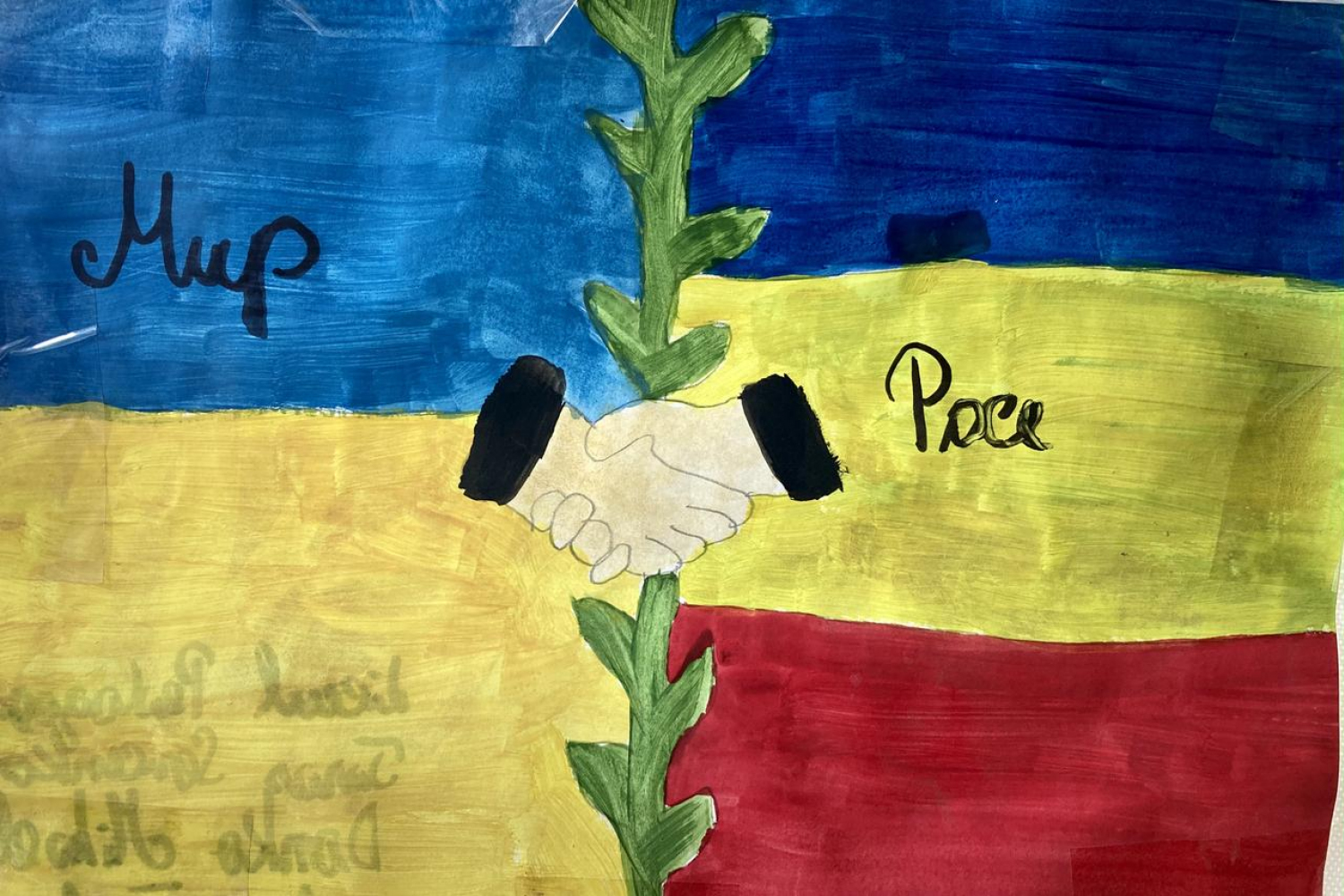
© Xander Stockmans
Initially, Romanian solidarity with neighbouring Ukraine was enormous. Romanian civil society did pioneering work on the Romanian-Ukrainian border. MO* was there at the time, and has now returned. “Here, it is not like in the Netherlands, Germany or Belgium, where the education system has years of experience in integrating children from war zones.”
Translation of this article is provided by kompreno, using a combination of machine translation and human correction. More articles from MO* are included in kompreno‘s curation of the finest analysis, opinion & reporting — from all across Europe, translated into your language. Original source.
Yevgeniya Kalenchenko was surprised when she saw a sign at the entrance to a shopping centre in the Romanian city of Cluj-Napoca last year: “Parking in the Iulius Mall car park is free for Ukrainians.” “Oh, thank you,” was her first reaction. She is from Kiev and a refugee in Cluj.
The message at the mall was indicative of the overwhelming solidarity with Ukrainians in Romania in the first months after the Russian invasion of Ukraine. MO* was also in Romania at the time, in Cluj-Napoca and at the border in Sighetu Marmatiei. We returned a year later to keep our finger on the pulse.
“Unfortunately, solidarity has diminished,” says Istvan Safar, who coordinated the relief effort in Sighetu Marmatiei.
It seems normal that spontaneous solidarity decreases when the number of refugees goes down. But according to Safar, there is more to the story.
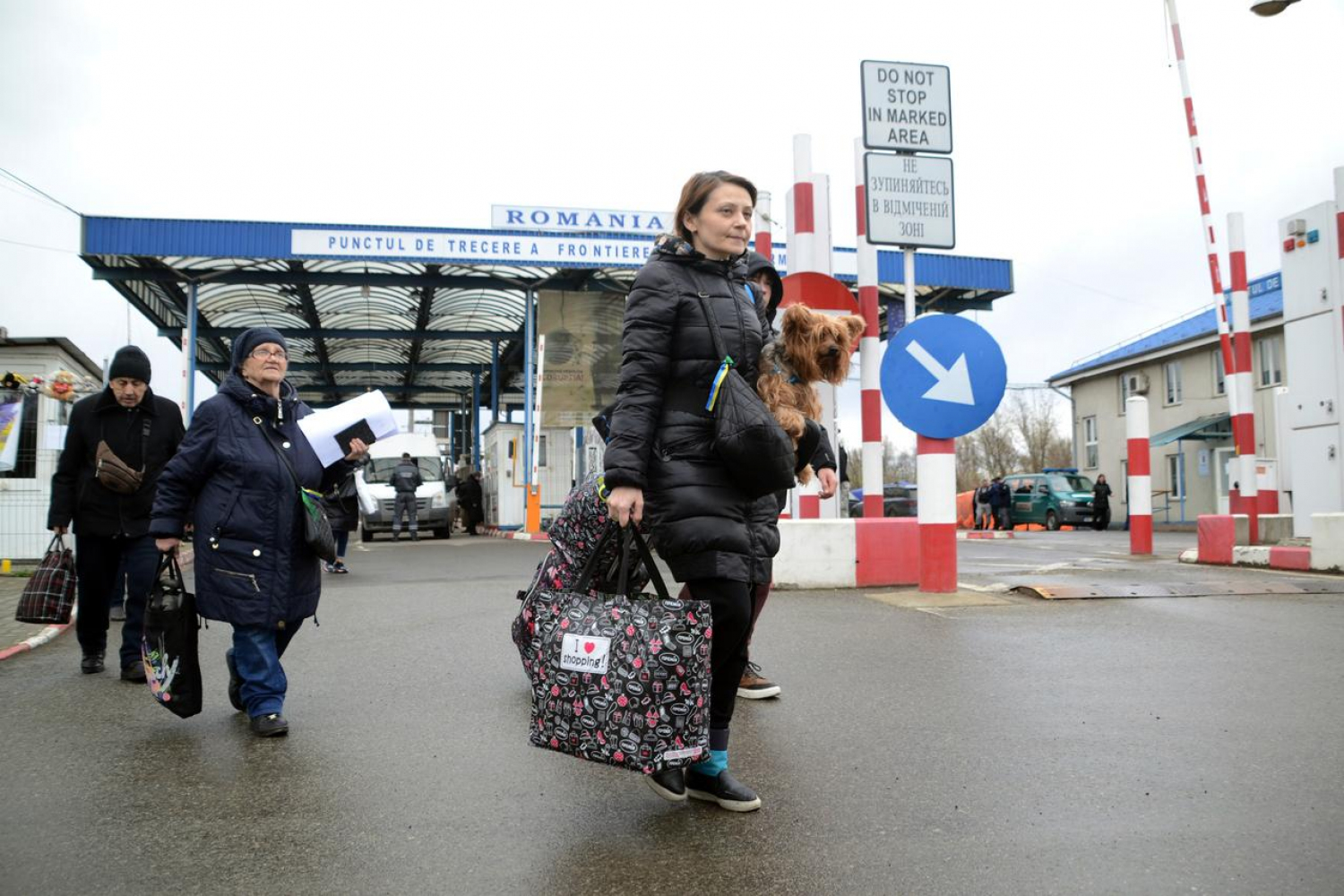
© Xander Stockmans
“Most of the Ukrainian war refugees have now moved on to other countries or returned to Ukraine,” says Safar. “There is a growing perception that Ukrainians who have stayed in Romania are mostly Ukrainians from the border region who are not fleeing the war. They are only here to take advantage of aid for genuine refugees.”
“In my 25 years of experience of providing aid in conflict situations, I have never seen such an overwhelming response.”
Many Ukrainians cross the Romanian-Ukrainian border back and forth. Since the beginning of the Russian invasion, 2.5 million crossings into Romania and 2 million back into Ukraine have been registered.
Of the nearly 6 million registered Ukrainian refugees, most are in Germany, Poland and Russia. 134,625 are currently in Romania. This number has been stable for some time.
There have also been positive developments. In 2019, there were only 2,000 asylum seekers in Romania. Few people in government departments were trained in refugee law or had experience in refugee policy. Only a dozen organisations across Romania were working on refugee integration.
This has changed. Both the government and civil society are now more involved in refugee protection and integration.
“International NGOs such as the International Organisation for Migration and Unicef have withdrawn from the border, leaving Romania largely on its own,” says Istvan Safar, who coordinated aid on the Romanian-Ukrainian border. The most important thing now is integration. We need to guide the refugees towards sustainable integration into Romanian society.
The integration initiatives of the Romanian government and civil society are conveniently bundled on the website www.dopomoha.ro. For example, Ukrainian refugees can apply for free job counselling from the National Agency for Employment. The Jobs4Ukraine website lists job vacancies.
Ukrainians can also find information on how to apply for financial support from the UN refugee agency UNHCR, enrol their children in school, and find a house.
All for Ukraine
Last spring, the Romanian Peace Institute Patrir organised its latest humanitarian aid mission to Ukraine.
Just one day after the Russian invasion, the organisation had launched an appeal for help. Its office became a collection point for aid. “In my 25 years of experience of providing aid in conflict situations, I have never seen such an overwhelming response,” said director Kai Jacobsen at the time.
“A queue of hundreds of metres formed outside our office. And that one sentence, repeated thousands of times: how can I help? People brought everything they could.”
In the first two months, Patrir organised no less than 20 relief operations, taking donated goods to the border with Ukraine. And on to major humanitarian hubs like Chernivtsi, a Ukrainian city on the Romanian border.
Chernivtsi was a Romanian city until the Second World War. Despite tensions throughout history, there is a lot of engagement between Romanians and Ukrainians in this border region. We meet Olha, a Ukrainian woman with Romanian roots. She is coordinating the humanitarian centre in Chernivtsi.

© Xander Stockmans
In return, ethnic Ukrainians have offered their services in Romania, for example as drivers for trucks carrying dozens of tonnes of medical supplies. “Not only for the wounded, but also for the chronically ill, diabetics, cancer patients, pregnant women,” Isabella Tirlogea from Patrir told MO* last year.
In the immediate aftermath of the Russian invasion, the local authorities in Cluj were also quick to respond. “The mayor took the initiative to bring together all schools, consulates, civil society organisations, agencies and businesses. That was the seed of the All for Ukraine relief consortium. We divided up the tasks: help at the border, legal advice, transport.”
Naturally, many donations came from within Romania itself, but also from countries such as Switzerland and the United States. Over the past year and a half, the All for Ukraine consortium has delivered a total of 1,300 tonnes of aid to Ukrainian humanitarian hubs.
Aid agencies have left
“We have now shifted our focus from emergency relief to long-term social reconstruction,” says Jacobsen. “For example, with the Ukrainian Institute for Peace and Common Ground, we are training 500 schools in Ukraine to help them deal with traumatised pupils.”
In Cluj itself, the Patrir Peace Institute is now focusing on the sustainable integration of Ukrainian refugees. This is urgently needed as all international aid agencies have left. “They did so without any consultation with Romanian partners like Patrir,” says Jacobsen.
“This has led to a sudden drop in funding, which has increased the vulnerability of Ukrainian refugees. To direct refugees to the right help, we are working with social workers, language schools, legal organisations and Ukrainian psychologists here in Cluj.”
“We have also helped to set up a Ukrainian self-help organisation that can advocate for the needs of the Ukrainian community in Cluj.”
From 500 to five refugees per day
“The solidarity of ordinary Romanians and local Romanian NGOs is overwhelming,” said Istvan Safar, coordinator at the border, last year. “Donations are pouring in. At the beginning it was chaos. The government was absent for a while and there was no one to coordinate everything. Hundreds of Facebook groups were calling for donations.”
At the border itself, we met several Ukrainians fleeing to or through Romania — Anna from Kiev, for example, at the Sighetu Marmatiei border post. She was accompanied by her husband. He was allowed to leave Ukraine because he worked in Estonia and had a disability in his eye. The couple were on their way to Estonia.
Or Illia, a rugby player, who was on his way to Bucharest to continue his studies in Canada. He was at the border with his mother, whom he did not want to leave behind.
“The same signal comes from everywhere: solidarity has declined sharply, it sometimes even tends to hostility.”
They were just four of the hundreds of thousands of Ukrainians who crossed the so-called Friendship Bridge over the Tisza River between Ukraine and Romania at Sighetu Marmatiei.
Within months, a well-oiled machine had emerged from the chaos. On both sides of the border, ordinary people put aside their daily lives to stand ready for the refugees.
Dana Ivascu, deputy mayor of Sighetu Marmatiei, explained how this first reception took shape: “In these tents, different organisations are helping the refugees with transport and first advice on housing, education for children, work. Everything is looked at here, with the help of translators.”
The volunteers called the system “Blue Dot,” after the blue dots on the tents. They insisted that no one should leave the tents with unresolved questions.
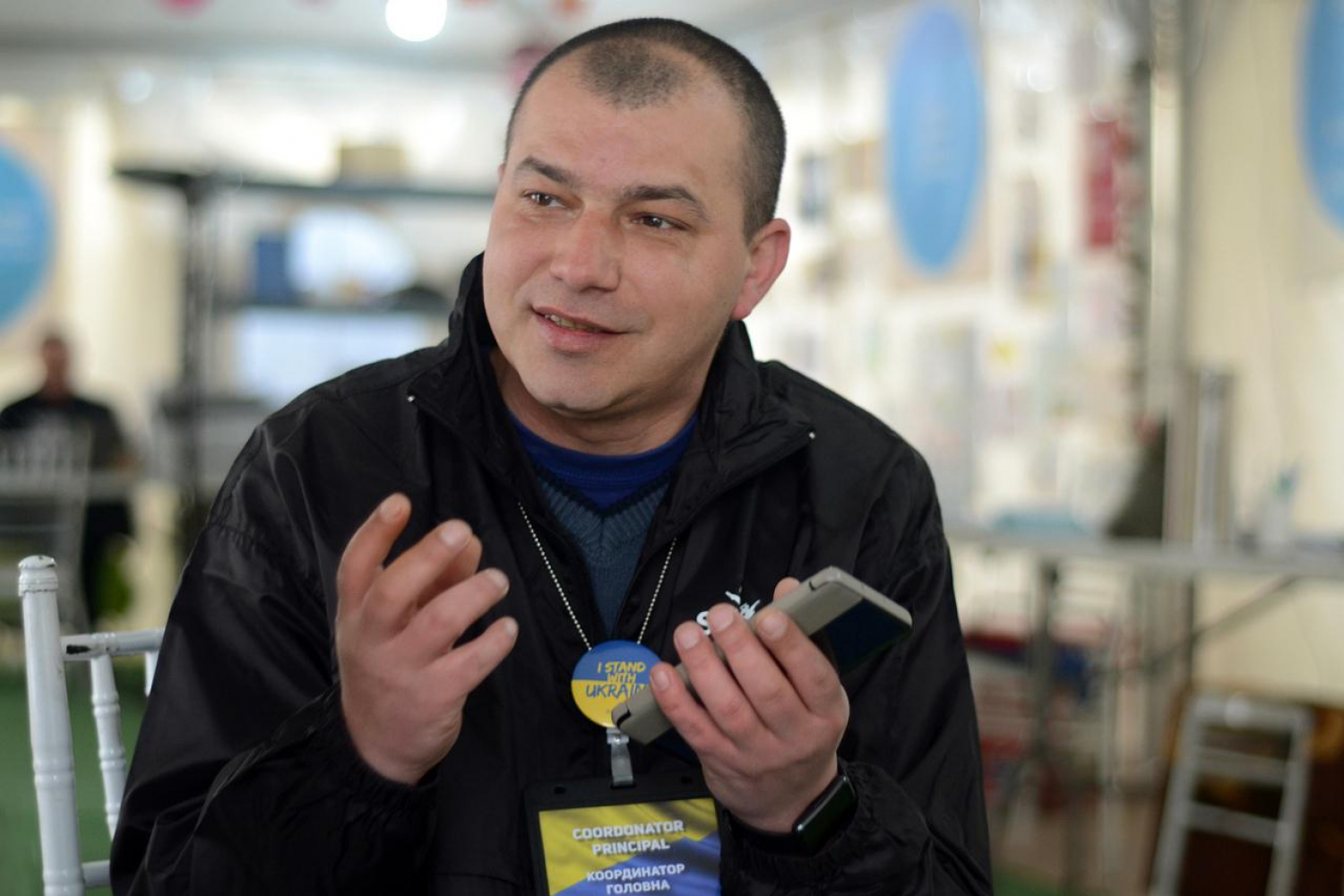
© Xander Stockmans
“Unicef, the regional government of Maramures province and local NGOs got together to coordinate everything. That is how this streamlined system came about.”
Unicef coordinated everything. “But you should not forget that this was born out of solidarity from the bottom up in Romanian society. What you see here is unique in Romania. Other border towns took it from us,” coordinator Istvan Safar told us at the time.
But today, not all noses are pointing in the same direction anymore. “The same signal is coming from everywhere: solidarity has diminished greatly, it sometimes tends towards hostility,” says Safar.
He now represents Sighetu Marmatiei at weekly meetings between the ministries of health, education and interior at national level. There, policy on Ukrainian refugees is coordinated between the various departments concerned.
“I see the reality in Sighetu Marmatiei, and in the meetings I hear about the rest of the country,” he says. “There have been incidents, for example with rental properties. Some landlords complained about the Ukrainian refugees. Negative attitudes towards Ukrainian refugees are also growing outside the housing sector.”

© Xander Stockmans
At the border, local NGOs are still present in the tents, but far fewer refugees are arriving. “Where once 500 arrived every day, now there are no more than five a day. This summer, Blue Dot will close. Unicef and UNHCR also consider the situation of Ukrainian refugees in Romania to be stable.”
A section of civil society remains active on behalf of Ukrainian refugees through Facebook groups such as Maramures Hosting Ukraine.
A hot meal
A year ago, Raimonda Bogdan and her organisation A Hot Meal were waiting for Ukrainian refugees at Cluj railway station. They had arrived by train from Sighetu Marmatiei.
The volunteers had been cooking hot meals for poor people in Romania for years, and Raimonda had asked the city if they could renovate an unused space in the station to serve food to passing Ukrainian refugees.
The corridor of Cluj station was covered with posters reading “You are not alone.” Ten volunteers were standing ready, sometimes for just a handful of refugees. They waited for the refugees by the railway tracks and escorted them to the area where they could get food.
“We are still helping at least 150 Ukrainian refugees a day. We even have Palestinian volunteers.”
The police told the volunteers in advance how many refugees would be on the train, Bogdan said. This allowed the volunteers to prepare the food.
Last autumn, A Hot Meal stopped its permanent food distribution at the station. But they have not stopped helping, quite the opposite. They continue to work with the police.
“We have an agreement with them: if more than five Ukrainians arrive, they call us and we provide the reception with food,” says Bogdan. “We even have a Ukrainian cook who prepares Ukrainian food.”
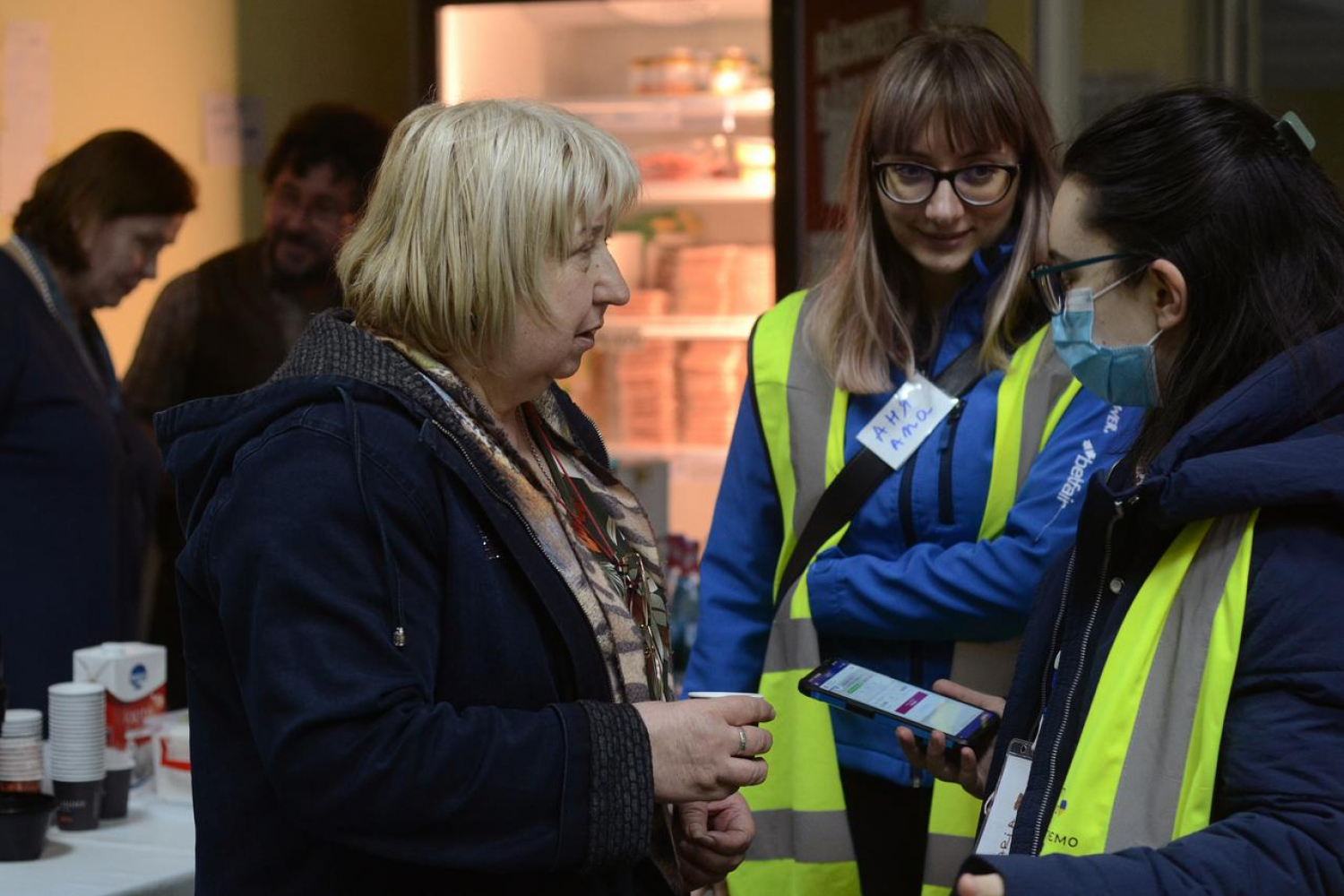
© Xander Stockmans
Safety and integration
The doors of A Hot Meal are also always open in the city. Every day, volunteers serve a meal to at least 150 Ukrainian refugees. Both new arrivals and people who have been here for a while.
“When they arrive, I often see the fear and stress on their faces,” Ana, one of the volunteers, told us last year. “When they leave, they are calm and feel safe. It makes me feel fulfilled that I can give these refugees a sense of security.”
Ana is from Moldova, a country between Romania and Ukraine. Romanian is the native language of the Moldovans, but most also speak Russian. They are well placed to interpret in Romania. “I read on Facebook that they needed help in Cluj,” Ana explains. “And I had already been in Cluj. I studied here in 2014.”
Today, months later, Raimonda Bogdan told us: “We are doing even more for the Ukrainian refugees than we did last year. It is more than just food, it has become a small community. If they have questions about integration, about activities for their children, about housing, about finding a job, we help them.”
“We are the only organisation in Cluj that still works with Ukrainian refugees on a daily basis. We still have many volunteers from Cluj itself, but also Ukrainian and even Palestinian volunteers.”

© Xander Stockmans
Cluj International Women’s Club
“For us, the storm of the emergency situation for Ukrainian refugees has subsided,” says Anna Bollick of the International Women’s Club (IWC) in Cluj. This organisation has been helping expats and other immigrants to integrate in Cluj for some time. In a building they rented and renovated, the IWC staff themselves prepared 70 rooms for Ukrainian refugees after the Russian invasion began.
“We are currently hosting 30 families,” Anna Bollick told us when we visited the building last year. Alina Voronina was one of the Ukrainian refugees IWC helped to settle there. Volunteers found Alina Romanian language lessons, a drama club for her daughter, a place to rent.
“I had never heard of Cluj,” Alina said at the time, surprised by the welcome she received in Romania. “I had to change my opinion about this country. Russians always say that Ukrainians and Russians are brothers. But that is more true of the Romanians.”
IWC also worked with an American foundation, the Open Fields Foundation. “We collect people by name and passport number. We opened a bank account for them and the Open Fields Foundation deposited 500 lei every month,” Bollick said.
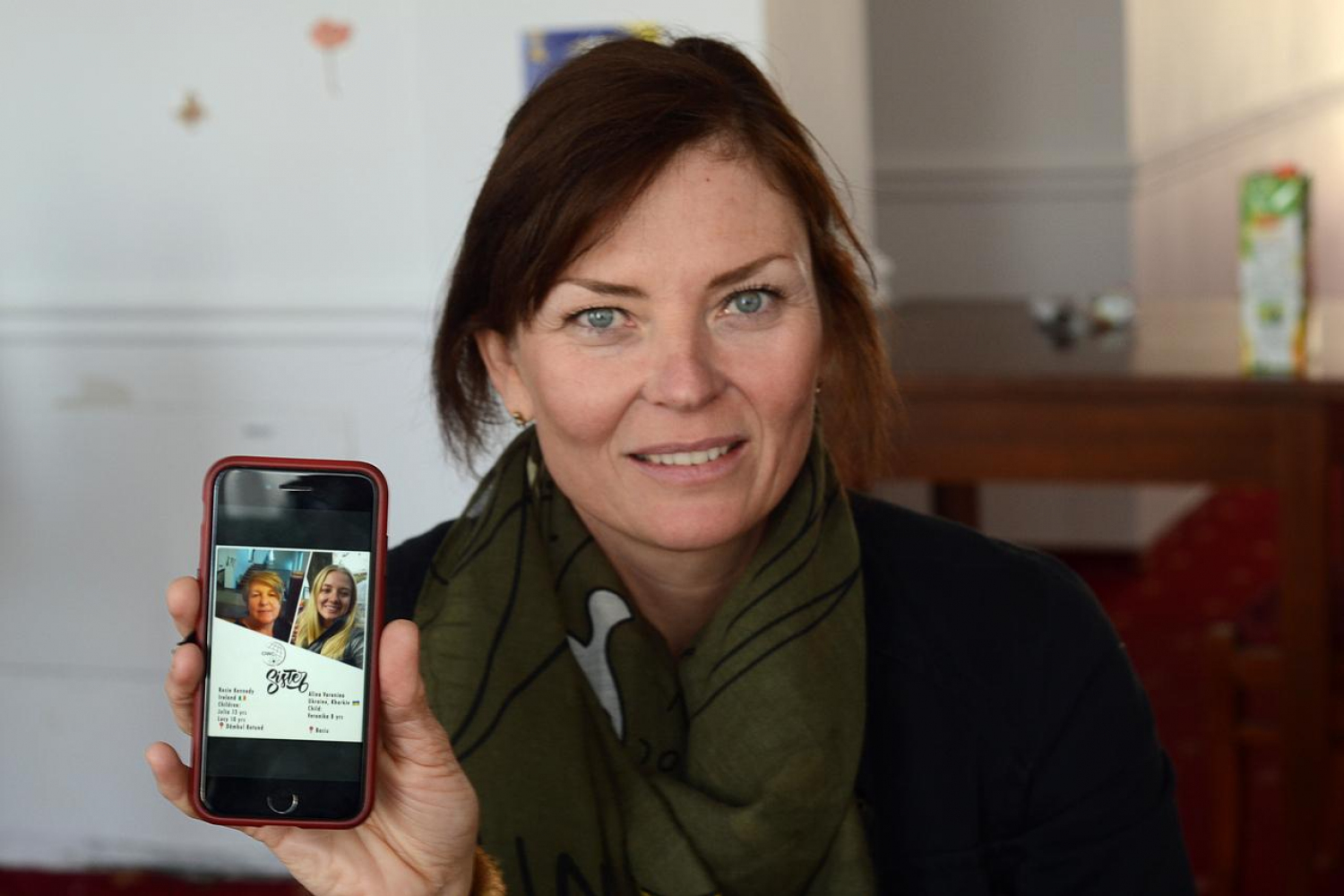
© Xander Stockmans
With far fewer Ukrainians arriving, IWC has phased out this shelter, Bollick told us. “The building, for example, is now owned by a Ukrainian who runs it herself.”
“We are back to our core mission, which is to help newcomers integrate into Cluj. Of course, Ukrainians can still become members, and then we do for them what we do for other newcomers. But many of our Ukrainian members have already left.”
Take Alina Voronina, for example. She has moved to Austria. “Many of my relatives also live here,” she says. “Austria is a great country that helps Ukrainians. My daughter is attending a good school. I am not working yet, but I am studying German intensively and my course ends in October. I don’t think it will be difficult to find a good job after that.”
Ukrainian children in Romanian schools?
More than a year after the invasion, what about the education of Ukrainian refugee children in Romania?
The UN Children’s Fund, Unicef, is now financially supporting the Ukrainian school UA Educational Hub. This was uncertain a year ago, and founder Kseniia Shurayeva was eagerly looking forward to it. Shurayeva, a Ukrainian activist, works with Patrir and All for Ukraine.
With the help of the All for Ukraine consortium, she had already recruited teachers, volunteers and translators. Three mornings a week, 130 Ukrainian students receive lessons and homework support in the dining hall of the Royal International School.
Thanks to UNICEF’s support, Shurayeva is now able to pay teachers’ salaries and buy textbooks and other educational materials. The textbooks are provided by the Ukrainian Ministry of Education. There are now 24 teachers working at the UA Educational Hub.
“Romanian schools are not at all ready to integrate foreign-language, traumatized children.”
The school is running well. But Kai Jacobsen, director of Patrir, is worried: “Unicef itself does not know whether it can continue to support the project. And starting next school year, Ukrainian children are to attend Romanian schools. It sounds good, and it’s what the European Union wants, but it could be dangerous.”
“Romanian schools are not at all prepared to integrate foreign, traumatised children. It is not like the Netherlands, Germany or Belgium, where education systems have years of experience in integrating children from war zones. At the very least, Romanian schools should be supported through language and trauma recovery programs.”
Jacobsen is receiving signals that Ukrainian parents are afraid to send their children to Romanian schools. “This is why projects like our UA Educational Hub are so important. All stakeholders need to listen to the concerns of Ukrainian parents themselves, and this is not happening enough.”
On the other hand, the UA Educational Hub is not officially accredited as a Ukrainian school. This is not possible outside Ukraine. “Unfortunately, there is still no agreement between the education ministries of Romania and Ukraine,” says Istvan Safar.
Housing
Housing problems that have long plagued the integration of refugees in Western European countries are now surfacing in Romania.
“For example, Romanian landlords are increasingly suspicious that Ukrainians will no longer be able to pay the rent,” says Istvan Safar. “We are already seeing that Ukrainians are having a harder time finding rental accommodation.”
This is because financial support for Ukrainians is becoming uncertain, and because the Romanian government recently decided to end the programme of financial support for landlords.
Until then, landlords could receive financial support from the government if they rented their houses or apartments to Ukrainian refugees for free.
For example, the Romanian Alex, a doctor from Cluj, offered his flat to Ukrainian Yevgeniya Kalenchenko. Yevgeniya was an administrator at a hospital in Kiev and had previously taught Hindi for many years. She became a refugee in Cluj.
Alex told MO* last year: “We were on holiday in the mountains when the war started. I posted on the United for Ukraine Facebook group that I could offer a flat in Cluj. I asked the government for help. They give financial compensation to people who help Ukrainians.”
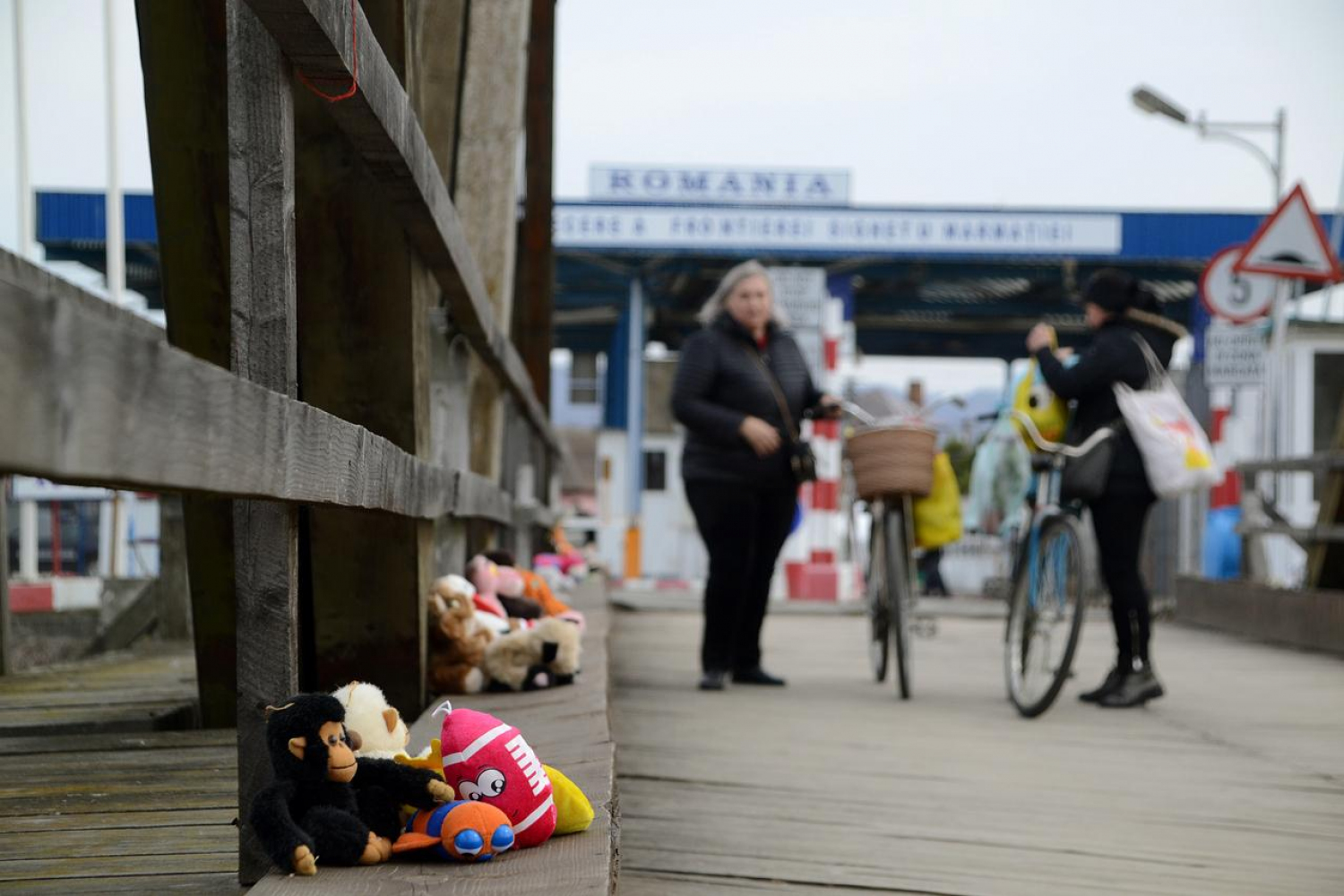
© Xander Stockmans
The Romanian government is now replacing support for landlords with direct support for Ukrainian refugees. Until the end of 2023, they can receive financial support for housing and food in the form of a monthly lump sum.
After that, the support will stop and they can register as unemployed if they wish. They will then receive unemployment benefits and job counselling under the same conditions as Romanian citizens.
However, Ukrainian refugees looking for accommodation and landlords in Romania can still register on the Un Acoperiş (Romanian for “One roof”) website, which will then connect them with potential landlords.
The UN refugee agency, UNHCR, is also still offering limited financial assistance. Ukrainians in Cluj can go to the UNHCR centre in the city centre. But last winter, this support amounted to only 131 euros per person, for the whole winter.
Maak MO* mee mogelijk.
Word proMO* net als 2798 andere lezers en maak MO* mee mogelijk. Zo blijven al onze verhalen gratis online beschikbaar voor iédereen.
Meer verhalen
-
Report
-
Report
-
Report
-
Interview
-
Analysis
-
Report










 Oxfam België
Oxfam België Handicap International
Handicap International